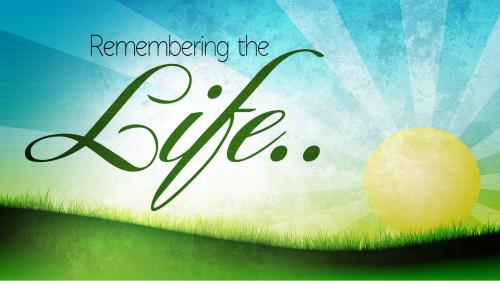-
The Hope Of A Joyful Awakening
Contributed by Rodney Johnson Sr., on Nov 28, 2017 (message contributor)
Summary: The sermon reminds that death is not the end; God will awaken our bodies to glory and life everlasting.
Hope is the expectation of attainment. A man without hope has no fear. It is also true that a man without fear has no hope. Those who were recently stranded on the roof-tops during Hurricane Katrina remained hopeful that someone would rescue them. It is that kind of hope that keeps one afloat during life’s high tides. When hope is absent, giving up is present. This present life is a continous mixture of good and evil, joy and sorrow, ups and downs, triumph and tragedy; it naturally prompts the reflecting mind to seek a more stable and permanent dwelling. Like the Saints of old, we desire a better country. The Psalmist does not deny the possibility of death but he affirms a hope in a joyful awakening. The word awakening is a hopeful term. The word awaken means to cease from sleeping. To become arouse or to become active again. He reminds us that death is not an end. It is a falling asleep that results in a joyful awakening. It is the depositing of a seed in the womb of the earth and the hopefulness of a blooming forth. The earth is a massive cemetary. There are dead stuff everywhere. The cemetary is not the only place where dead stuff exist. We bury dead bodies. But there are dead spirits within our churches. Although there are many kinds of death, the word of God and His Spirit are the only awakening power. Jesus is the final authority over death and life. Accidents and terminal illness cannot kill without Jesus’ approval. Death in a sense is s servant of God. He has the keyes to both: death and hell. He speaks and men live. He speaks and men die. He speaks and the dead will get up again. Some have called this the land of the living but in truth this the land of the dying. Solomon declared that it was better to attend a funeral than a party. At a party men laugh and dance. But at a funeral men reason and think. Psychologically when ever we look into a coffin, the person we really see, is ourselves. The burial is a kind of separating ourselves from our hurts and sorrows. We hastily deposit the dead into the earth in hope that we will forget that we too will die one day. We submerge ourselves in brief sorrow and quickly move on with our lives. We depart full of uncertainity as to when our time will come. We try to enjoy life with no thought concerning death. We know its coming but we try to out-run it’s arrival. I submit to you today, that nothing we can do will prevent us from meeting the wage of sin. The fear of dying is the oxygen for spiritual living. In living we must expect death but in dying we expect to live again. It matter not how much the believer-believes, he too has some fear. The Psalmist reminds us that men of this world live for the now. But may I tell you today, that the present truly does not exist. The present becomes that past so quick until it is very difficult to define. The believer looks at earth but he gazes at heaven. He feeds his spirit on the droppings that fall from the tree of life. He eats the bread of the earth but is sustained by the manna come down from heaven. He sips from Jacob’s well but he drinks from the fountain of life. His unattachment to this world’s system prevents utward circumstance from overwhelming his spirit-man. In our darkest storms, we must focus to see the light. Tertullian says; "Hope is patience with the lamp lit." True hope is found only in God. He is the God of living hope. That living hope is the Holy Spirit living in our hearts. In this world there is hopelessness everywhere. There is hurt everywhere. There is pain in every pew. There is sickness in every sanctuary. There is coldness in every church. There is a snake in every garden. There are cemetaries in our church yard. There are holy folk in hospitals. There are preachers in pain. There are missionaries on medicine. But then, it seems that men of this world are living on the high horse. They have the fat of the land. They have the silver and the gold. But the Psalmist separates himself from the world systems; he says; "As for me." Let us consider the following from the text:
I. Personal Affirmation. (As for me)
II.Beautific Vision (His Face)
What does it mean to see His face?
1. Nearness-I am present with Him...He is present with me...Proximity..We are together forever.
2. Blessedness-Felicity, delightfulness, Joyfulness.
3. Honor-Priviledge, His throne, His crown, His glory.
4. Power-No more possibility of hurt, No more death, No more sorrow, No more fear. I will be near His power.

 Sermon Central
Sermon Central



